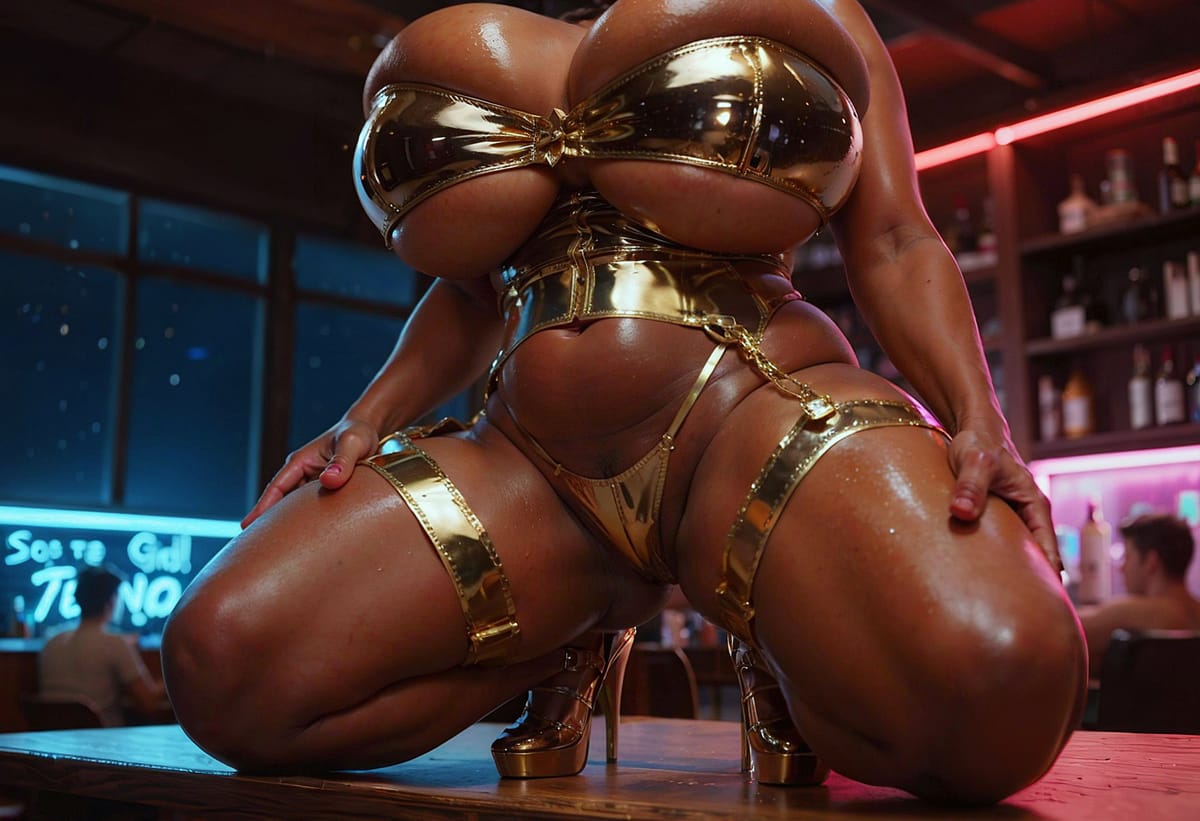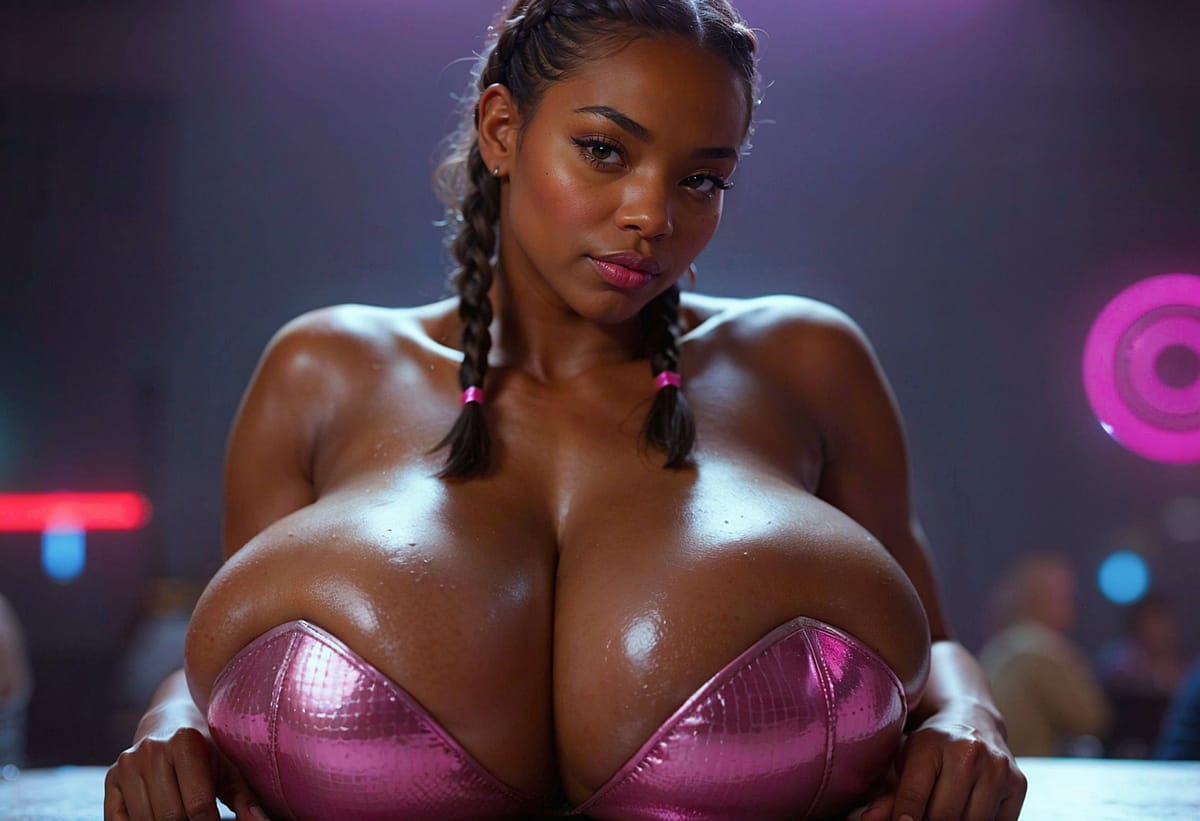Writing Sluts with a Socialist Heart
Reflections on the morality and ethics of my short movies, stories and characters

My work, like that of most authors I think are first and foremost about entertaining the reader or viewer at some level. When I make a busy big ass lady, nude in a provocative pose, then there is no other deeper meaning than a love of the nude female form.

A greatly shortened version of this story if you think it is too long (used AI to shorten)
But then there are my written stories, videos and songs. They are of course there to entertain you. Play into your kinks or fetishes if you will. But underneath that I have a moral and ethical perspective. An ideology or message if you will. However I never wanted to hammer you over the head with what I believe. I think good fiction or stories should have some ambiguity. Allow for readers or viewers to discover things for themselves. Maybe sometimes there are perspective you can gleam that I never even intended.
I have enjoyed a lot seeing how you interpret my stories or videos. Probably most of the time you don't even realize that you are making an interpretation of my message. Stories can have many layers to them. Of all things Simpsons and South Park comes to my mind. At the upper level there is a rather juvenile humor. Something almost any one of any age can enjoy.
But as you dig deeper there is a layer of satire which opens up a new world of humor and below that societal reflections and criticism. For instance at the top level South Park has stuff like farts and poop. Stuff even a 3 year old can laugh about. In Vieregg's World the equivalent is huge boobs and big asses. Go a little lower and there are things like how e.g. Big Gay Al the flamboyant gay scout leader was not the child molester but a "straight" man named Mr. Grazier. Quite a military style macho man.
South Park deals with overt caricatured characters, but there is a deeper message behind it. It says something about how we has a society judge people based on appearance and prejudice, while the real danger comes from someone who looks "normal" and "trustworthy" such as Mr. Grazier in the episode "Cripple Fight" (Season 5, Episode 2). Or perhaps not normal. He’s the kind of figure conservative communities idolize:
“Tough love, firm hand, no-nonsense leadership—exactly what boys need these days.”
But South Park flips the table:
- He’s not a role model. He’s the danger.
- His discipline isn’t virtue—it’s a mask.
- His authority provides cover for abuse.
It turns out that Mr. Grazier is actually a pedofile nicknamed Mr. Slippyfist by the police.
Now, I will not claim to have any of the brilliance of the South Park creators, or the creator of the Simpsons or Family guy, but I very influenced by how they use humor as social commentary. How they tend to use caricatures and surrealism to both entertain and say something deeper.
In this way e.g. Katrine Kurebakken and her daughters Åsne, Tuva, Eira, and Marte are caricatures. Nobody would be this naive and as extremely addicted to sex. While Tucker-James is kind of a caricature of the kind, cautious young religious man. Like there is nothing bad in Tucker-James. He just wants to be good and kind to everyone while following the teachings of the Bible. In reality someone like him would likely have been rather judgmental towards the Kurebakken family. But actually he isn't because he tries to be respectful and kind to everyone, even when they are huge sluts like the Kurebakken family.
Having said that I should clarify that I kind of hate the word "slut" in what it conveys in meaning. I am a very sex positive guy, so I don't think a word like slut should actually exist. But on the flip side so much kinks, fetishes and sexual fantasy actually comes from these things. In a sexual fantasy setting I love the idea of sluts.
My works is all an ode to slutty women around the world. I want to thank you for enriching male fantasies since the dawn of time. You should be thanked rather than condemned. What would porn and sex fantasies be without you?
And that gets me to an observation I have made while talking to many of you over the last 3 years. My experience is that women are the ones who primarily get what my message and perspective is. The others are fellow Nordics. Perhaps not surprising as that is my culture and it is a very feminist corner of the world.
Here is a thing I want to remind people of when it comes to judging the art and the artist. Swedish movie creator Ingmar Bergman cried when Hitler died. Norwegian author Knut Hamsun regularly wrote and even argued with Hitler. He was very clearly a Nazi but yet his works is beloved people on the Norwegian left. British George Orwell who wrote 1984 and an Animal farm is beloved by many people on the right. In fact he had to explicitly write and clarify that everything he has written has been for the advancement of Democratic Socialism, because many saw him as a right-winger, because he heavily criticized the authoritarianism of Stalin.
The Children book author Roald Dahl, who wrote Charlie and the Chocolate Factory, The Fantastic Mr. Fox and many other beloved works for children was an anti-semite. He also had Norwegian parents by the way. Still I don't think his works promote anti-semitism. Nor does the work of Bergman or Hamsun. It shows that people who take their art serious can create things that can stand on its own legs regardless of their own political and ideological beliefs.
The reason I bring this up is because I want you to be able to enjoy my work even if you do not share my convictions. Most of you likely don't. I am, like George Orwell, a Democratic socialist. But unlike him I am a feminist. On a site which is very much about sexualizing and objectifying women, I am going to be an odd outlier. No doubt about it.
But I try in my work to open for many interpretations and for nuance. If anything I celebrate human diversity and our flawed nature. I am deliberately trying to avoid having characters who are inherently good and virtues. Povel Vieregg in the stories is an alter-ego for myself and I deliberately made the choice that he was going to be quite flawed. It is too easy to write stories where the main character is an idealized version of yourself. Such characters in my view are rather boring. Vieregg in the story is spineless, often insensitive, overly argumentative and mildly sexist. But he is someone still trying to do the right thing. He is just a bit slow on the uptake sometimes.
What Male Fans Tend to Misintepret
People are free to interpret my work in many ways. You can find meaning in it based on your own lived experiences which are different from mine. But invariably you will make assumptions about my motivations or message. And this is where guys tend to go wrong. Women seem to get my thinking. Perhaps not surprising as I tend to write from a feminist perspective.
For instance I have seen people assuming that Idun Amalie Wang is an aggressive bitch who isn't very accommodating and nice to men around her. And some see the Kurebakken sisters as a form of succubus. A form of evil seductive temptresses.
This is quite opposite of my intention. To me Idun Amalie Wang is a kind of voice against objectification of women. But she is intentionally a flawed character. She isn't a nun covered up but rather a voluptuous sex addicted woman with temper management problem. Part of this is because I don't think people should need to be perfect for us to emphasize with them. And we need a reminder that real people are flawed. If we cling to black and white stereotypes of people it will be very hard to empathize with anyone.
Idun is a woman who gets taken advantage of and dismissed because of her own hyper sexuality and looks. My perspective here is that you are not a bad person because you look sexy, like sex and have big boobs. Ultimately good morals is about treating other people with kindness. Idun may not be always nice to Vieregg, but that is primarily in that she is sticking up for herself because he is being an asshole. I do have much respect for feisty women with some bite. Idun was inspired by some badass women I have grown up with who didn't take shit from anyone.
For the Kurebakken sisters Åsne, Tuva, Eira and Marte it is useful to know that I write with a Nordic social democrat / socialist perspective. What do I mean by that? Bear with me because this takes a bit explaining to do if you are not a Nordic.
I lived in different conservative and deeply religious states in the US, at times with deeply religious American families. That is a bit of my inspiration for Tucker-James. There are a lot more people in this world with that perspective than Nordics. I loved the American family I stayed with very much. Tremendous hospitality and they allowed me to get a peek into a world that was utterly alien to me.
When I write, I am hoping to do the reverse. Give all of you, many who might be conservative Americans, a peek into my Nordic, or specifically Norwegian world. We think a lot more in terms of groups, community and society, where American conservatism begins with the individual. Each man is a captain of their own destiny. Through will power and determination you can be anything you set your mind to. That is the American dream in a nutshell.
But that just isn't the Norwegian dream or thinking. We see people must more as outcomes of the environment and society we live in. People are flawed, stumble and fail frequently. Thus we must have each other's back. Have a hand to catch and lift up those who trip and fall. It is baked deeply into the culture. Americans talk a lot about "freedom" and "choice." Those are strong positive value words in America. In Norway words like "togetherness" and "solidarity" are more important. We have words that don't really have equivalents in English related to togetherness called "dugnad" and "dugnadsånd". The former is a word for working together for common good. It is long cultural practice in Norway. In neighborhoods, farming communities, towns, everywhere people would get together and do something for common good.
Rather than hire a company to cut grass, trim hedges, paint public fences etc, the neighbors would go out together and do this together. And we tend to have mixed neighborhoods with rich people, middle class and even sometimes poor people in the same area. So the cab driver might be cutting a hedge in the neighborhood together with the CEO of a company. This spirit of working together for common good is called "dugnadånd" in Norwegian.
Some historical examples to help contrast our history and culture from e.g. the Anglo world which is much better known online. In the UK and the US railroad, phone networks and telegraph lines got built by for profit capitalist enterprises. In the US the robber Barons that built the railroads are famous.
In Norway these things were built on the "dugnad" principle, the spirit of togetherness. Local people, local business, communities and the government did this all together. Railroad, phone lines and telegraphs were never built by capitalist enterprises but by the people working together with local businesses and government. Phone lines were often owned by the local community when done. The railroad itself was government owned. Power stations got built in similar ways. This community stuff goes all the way back to Viking age. An expedition with Viking ships was build by a community where everyone took part. In more civilized times Norway was still a powerhouse at the sea. Tiny Norway long had the third largest merchant fleet in the world. Per capita no nation has ever had as much tonnage as us. And these ships usually got built by a whole community together. A farmer gave timber for the boat, locals put in their savings. Some joined as sailors. Others joined to work on the boat. So when a ship was sent out, everyone in that community had a stake in that boat somehow and got some of the profits.
This mindset is everywhere in Norway still. Ironically it was invisible to me until I lived in America. What is unique to your society is just normal when you grow up in it. But I notice when living in the US how individualist everything was. In neighborhoods houses are like little islands. Once house, with yard and garage all together into one separate unit, detached from everyone else. This isn't how we build it. We often don't attach garages to the houses e.g. but place them in a cluster so that we can have a car free neighborhood. You park your car at a designated area. Then you walk into a neighborhood with playgrounds, parks, forest areas, footpaths etc. It could have shared facilities like a soccer field, area for BBQ, Frisbee or whatever.
This is how I grew up, and how my children grow up. Our recreation was on public areas shared with neighbors. Areas usually maintained through "dugnad."
I know this is a huge detour from the topic at hand, but I find that when discussing my different perspective with Americans it is very hard to get people to understand that my cultural background is just radically different from theirs. I might dress in similar Western clothes and sound like them. I am a white guy and so it is easy to think I am like any other white guy. That is another thing. In America one seems to often conflate skin color with culture, and so people will assume I am white American culture and perspectives.
This is why Imperial Norway thematically is what it is. It is about culture clash. Imperial Norway is completely different from the world Tucker-James comes from. Of course Imperial Norway is a crazy caricature of a sex crazed society. Norway isn't like that, but it is far more liberal on sex and nudity than the US. And that is certainly something I felt often both when American friends and relatives visited or I went to the US.
To give some examples to clarify how different it is. Same sex nude Sauna is the norm here. You can go to huge Sauna complexes in Oslo. And being naked is actually mandatory for both men and women. They will typically not let you in wearing swimwear.
When I grew up in the 1980s women being topless on the beach was kind of the norm. Yeah I saw relatives topless. It was a normal thing. Today with camera smartphones that has naturally changed. You go to a public pool and you shower naked with a bunch of strangers. Totally normal. Kids are usually naked on the beach up to a certain age. I literally never thought of pedofiles in this context until an American friend started fretting about it.
It is just that this was normal for us. We don't think about this in sexual terms. It was common in yards in the summer. I saw sisters of friends run around naked in the backyard when I was a kid. Like I didn't sexualize that in any way. I wasn't looking at them and thinking sex. That is what I find a bit sad in the world I live in now. Everything about the human body is getting so sexualized.
We did not equate human nudity with sex, the way I feel it is in the United States. You can find nude status everywhere. There is a statue of a naked woman outside where my mom lives. Nobody thinks about that as something dirty. We have a whole park in Oslo, Vigelands Parken, which is just statues of naked people interacting with each other. I know my conservative relatives were rather shocked when they saw it. But it isn't really sexual interactions, but people who want to see it that way I guess can.
I hope this does not read as something like "we are so much better" or whatever. I am only trying to get people to understand where I am coming from and why my thinking is likely different from most of you. I just didn't grow up in the same kind of society as most of you. Norwegian state broadcaster NRK literally makes TV programs about sexual fetishes for teenagers. My sex education in school painted sex as a very positive and nice thing. My American wife could assure me that that was definitely not the message she got in school.
But here is the interesting twist. Most pornography was illegal in Norway when I grew up, unlike the US. So while I was exposed to a lot of nudity growing up. More than Americans, I was exposed to much less pornography. Frankly not much at all.
That is something I noticed talking to Americans about their experience of learning about sex and the human body. It seems to very often comes from pornography because other forms of familiarizing yourself with nudity and the human body and its function as been ostracized in society.
I am pretty sure most Americans, and probably most people in the world, who are guys first saw a pussy in a porn magazine. What is the issue with that? It is put in a context where it is meant to sexually arouse you. I saw pussies at the beach in a non sexual context long before I ever opened a porn magazine.
Okay that was a long detour to get me to hammer home the point that my perspective when writing stories is very much about how people are shaped by their culture and environment. I know this well from my own experiences. So the Kurebakken sisters is not really about individuals who are sluts but about a culture that is hyper sexualized and how it affects people and their thinking.
This is of course heavily influenced by DOLL-3. You take a physical reality, the DOLL-3, gene complex in their DNA, and then you extrapolate from that how a whole society will develop its culture if everyone is very horny. Or all the woman that is. So the Kurebakken family is not about individual failings of sinful behavior of its members but rather about the culture and way of life in Imperial Norway for good and bad.
So from my perspective the Kurebakken family are not bad people as such. They are just a family with somewhat extreme behavior because of the extreme environment they grown up in and the DNA they have. Their sexual relations show their dysfunction, but I try to emphasize that they are still good people because they do their best to respect Tucker-Jame's wishes. They have a lot of love and empathy for him. I am purposefully contrasting this with his own cold family back in Minnesota. They may live a virtuous life according to scripture, but it is a family without real love.
The Kurebakken family is the diametrical opposite. They do not live a life of virtue by any stretch of the imagination. They are all non-repenting sluts. But on the flip side they have genuine love, respect and empathy for each other. I think my life philosophy aligns strongly with a cultural institution in Norway called The Cardamom Law. It is a children's book universe most Norwegians have grown up with. There is even a theme park here around the characters. The law states this:
- One shall not bother others
- One shall be nice and kind
- Otherwise, one may do as one pleases
It rhymes well in Norwegian. In English it just sounds a bit odd. That kind of sums up my life philosophy: I don't care if you are a bit titty slut as long as you are kind and nice to others. While you get no respect from me from dressing neat, having good manners, being a virgin but act like an asshole to other people.
While I am a die hard atheist, someone like Tucker-James can have my respect because he acts kind and respectful towards others. Even if the Kurebakken family does everything wrong with regards to what he has been taught he is not getting on a moral high horse and condemning them. He is simply saying: "this is not how I would live."
Some of my kindest and most respected friends have been deeply religious. We managed fine to have a friendship even if we had a completely different view of God. I should add that I grew up reading the Bible every week in school. I grew up in a country where Lutheranism as the state religion. I am actually member of the Lutheran church even if I am not a believer and have never been baptized.
So I am very familiar with the stories in the Bible. But I think that what we emphasized in class was very different from I think what is taught in the US. Our focus was on the message of Jesus: His philosophy of tolerance, non-violence, sharing. These are all values very much in line with modern social democratic traditions of Norway.
In fact the leader of the most radical socialist party in Norway (we have multiple socialist parties) is a devout Christian. She sees Christianity as sharing beliefs with her political convictions.
It has been something several socialists have worked on in the latter years, finding common ground with the Christian community in Norway. The Christian party in Norway while anti-abortion has also been a champion for the poor, disabled etc. While I do not agree with many of their policies I respect them for their heart. Some of the kindest and most honorable political leaders we have had in Norway has been from the Norwegian Christian Folk party. I emphasize this to make it clear that despite me being an atheist socialist it doesn't prevent me from admiring and respecting many Christians.
Anyway it is just my way of saying that I am not trying to setup the Tucker-James story as there being a good and bad side. It is not like Tucker represent the good and the Kurebakken family represent bad degenerates. It is two sides with positives and negatives caught in a culture crash and endless number of misunderstandings.
Individual Responsibility
This is a complex topic. As a Scandinavian and especially as a socialist I place less emphasis on individual responsibility and more responsibility on society than what would be common in American culture. And to clarify why am I talking about American culture specifically? Well that is my life. It is the culture I am most immersed in outside of my own. I have been married to an American for long time and over that time you get to learn a lot about how your upbringing affects your perspectives on everything in life.
I have a bit of an anthropologist mindset you might say. I am endlessly fascinated by how other people live and think. While other people might have been interested in pacific island cultures, Japan, native Americans or whatever my fascination ever since childhood has been with America. As a child I enamored with classic American cars with tail-fins. It is one of those big regrets in life that while I lived in the US I never bought a pink Cadillac with tail-fins. That would have been the dream.
It doesn't mean I absolve people of personal responsibility but I tend to place more responsibility on those who are privileged, wealthy and educated. They have the means to make sensible decisions. The poor and uneducated have less room to navigate.
We can contrast that in my story with the stripper and former hucow Terri Moreno and the man Rick Harlan, who abused her at the hucow farm Three Pines. Terri lives a life as a slutty stripper but do not have many other options. Her choices are limited in a racist society stacked against her.
One could say Rick Harlan is also affected by living in a racist society. It has shaped his views and perspective on black and brown girls in ways it might not have if he grew up in a more tolerant society. On the other hand Rick is a man of privilege in the world of Cedar Ridge: He is white and has a good job.
When Rick sees Terri at the farm attached to milk pumps crying, it should be obvious she is not doing well. He fails morally and really cannot blame society on that. An empathetic person would have asked how she was doing. And later when made aware he should have apologized and empathized with Terri, but he doesn't. His lack of empathy cannot be blamed on society. The selfishness is his own doing.
This is different from when Terri chose to become a stripper. It is a kind of career choice people will be judged for, but Terri didn't really have much other choice. She lacked opportunity. And her actions did not go against the Cardamom Law. That is the crucial part to me. Rick on the other hand broke the Cardamom Law clearly. He was not kind to others.
Conservative American vs Social Democratic Norwegian Take on Rick
I realize that when people of different background look at the moral fails of Rick then will see very different things. We can all see that he did something bad, but how do we see is actions in a grander scheme?
I think in the American conservative tradition people will see Rick as: "an individual sinner."
But that is not actually how I wrote Rick. Rather I wrote Rick as a structural metaphor. Let me clarify. You might see Rick as:
- A guy who wanted a woman too much,
- Gave in,
- And now rationalizes it because he can’t face guilt.
But I wrote Rick as a critique of respectable misogyny, the “Nice Guy™” whose politeness masks entitlement and rape logic.
That is a sharp contrast to seeing Rick as a morally weak man who failed a test of temptation, like a Biblical parable. Not an archetype. Not a type of guy. Just one guy.
If that is how you saw Rick, then that is fine, but it was never my intention in the writing. I wrote him to be a mirror—not of monsters, but of normalized male entitlement that hides behind manners, softness, and plausible deniability.
It is a criticism of the “Nice Guy™” archetype. How society excuses abuse when it comes in a polite package. This perspective comes very natural for women I think because they live it. They have experienced plenty of guys like that and how society often makes excuses for them.
So to many women Rick isn't going to be some random guy that just failed the morality test. Rather he is part of a pattern. Of course Rick is a caricature. That is the whole point. I deliberately amped up the whole "nice guy" behavior to make it more visible why it is so bad.
This is a common approach in all science fiction. Science fiction tends to take structural or societal problems that exist in today's society and make caricatures of them in the fiction. That is a way to shine light on the problem. A way to turn up the contrast or zoom in so we can see more clearly the problems we face in our ordinary society but perhaps we have been blinded to. The contrast is too low so we don't see it as well.
I use a lot of caricature, exaggerations and absurdities in my writing. For instance Vieregg Industries has a productivity boost because of Idun's boobs. They cause engineers to be very motivated to show up for work. This is of course utterly absurd but a way of blending erotica, humor and societal criticism. I am tackling workplace sexism through absurdities.
Now, don't over-interpret this. Entertainment is of course a big part of it. Some people can read messages into everything when there is really nothing there. I am a long term Nirvana fan. Kurt Cobain was also a feminist, like me, so I like a lot of the work he did. The message in his songs etc. Nirvana lyrics does of course have deeper meaning in many instances. But has Kurt himself points out, many times he just put in stuff that sounded good. It had no other deeper meaning.
Sometimes stuff I write is just there because I found it funny, erotic or interesting. It doesn't need to have a deeper meaning.
Another example is Zane and Colton's over the top racism and sexism. There is nothing subtle about it. The whole point of that is that when racism and sexism is that over the top it becomes comedy and it also serves as a way of criticizing racism and misogyny by making it look stupid.
Final Remarks
Okay that was a long post. I will try to summarize. My ambition is for my work to be accessible and enjoyable to anyone regardless of their beliefs or values. I deliberately try to put some ambiguity and openness for interpretation in my stories so readers or viewers find their own meaning.
But if you actually are interested in understand what underlying values and ideas drive my writing, and what my intentions are then you get that clarified in this article. I do write from a feminist and democratic socialist Nordic perspective. But I am very opposed to doing anything that comes across as stupid propaganda for my views.
And I think that is perfectly possible. The work of Ingmar Bergman, Roald Dahl, and Knut Hamsun has lasting value and appeal to everyone even if they were all anti-semites.
I am an old Bruce Springsteen fan. His "Born in America" is a song that is deeply critical of American society, and yet is often played as kind of patriotic song. It means art can take on different meaning and value to different people.





